- Home
- Laura Anne Gilman
Darkly Human Page 2
Darkly Human Read online
Page 2
And Viv looked into his wave-green eyes, and found herself there.
“I didn’t even know I was lost.”
The sun was warm on their faces. He plucked a strand of grass from her hair, finger-combed the tangled strands. “We’re all lost. The only finding’s in the final grave.” His voice was rough, his touch certain, sure.
“Were you…”
He touched his lips to her forehead, her nose, her lips.
Spoke of a hunger that drove him like a ship before sails. Of looking, and never finding.
Until now.
She dug her fingers into the dirt, listened to the hum of life below her. He had told her of the sushing of the sea breeze, the slap and slosh of the waves, the harsh cry of gull and the silent laughter of dolphins, and somewhere in her soul a longing had stirred.
“I wish…” But when her lover asked what she wished for, she merely smiled.
Even then she knew the danger of a dream.
The Traders set up their tents, their rope pickets, turned out their horses and spread out their wares. Villagers came, fast then slow, then again and again as the days wore on, stories updated and lies exchanged. And the trading had begun. There was a rhythm to it that none could recount the beginning of, and none could see the ending of.
Viv walked with the Harvester and listened as he bargained, studying what she would need to know, some day. It was all she had ever known. All she had ever expected. All she had ever desired.
“Where did you find this?” she asked, holding the blue glass to the sun to see it glisten. It was smooth, not sharp- edged. It looked like a raindrop, and felt like combed cotton under her fingertips.
“By the shoreline,” the trader told her, showing the other pieces, blue and green and sun-yellow. “Same place we picked up young Than.”
“I was bored,” he had told her. “Restless. And they seemed like a good ride.”
The Harvester frowned. There was no need for bits of colored glass. Viv touched the blue again, gently, and moved on in his wake.
“Tell me again about the ocean.”
He settled her snugly against his shoulder, watching the dust rise under pony hooves stomping around the edges of their corral. “At night, the sky is darkest blue, and the stars are polished silver like knifepoints cutting through. And the moon opens a path on the darkling waters that you would swear you could walk, if only you could take that first step…”
In his words, she could hear his heart beating, and it flowed from him to her until she could not tell where his beat ended and hers began. It was not the things he told her, she tried to explain to Rory, sitting on a log stump as he split and corded wood. It was the power he felt, the love that rose within him. The passion that spoke.
“He’s a Tidemaster,” Rory said, and said no more. It was all that needed to be said.
Whatever had brought him here, would surely wash him back out again. That was as it would be, and desire could not change it, not anger move it, nor wishes reshape it. She could rail, and storm, and it would change nothing of the truth. It was not for them, not this time.
“Watch,” she told him, and held out her hand. Palm down, touching the soil warmed from the morning sun. She sang to the seed, praising it, and it rose to her call, poking corner- tipped streamer through the dark rich loam, yearning for her as much as for the sun.
He touched the ground, touched her hand.
His tears were saltier than any she had ever tasted.
She watched the stars instead of his face, acutely aware of the heat rising from his skin as he lay beside her. The grass was cool on her bare skin, the ground beneath letting go of the day’s heat.
“I can’t remember our first kiss,” she told him. The taste, the texture, the sudden understanding—but not the time, the place, the moment. Had they never kissed before that moment, had it been a return to a kiss begun ages before?
“It was a lifetime ago,” he said. His fingers reached for her, stopping just shy of touching. Heat rose from his skin, sank into hers, returned.
“A lifetime,” she said. An eternity, without beginning, without end. She clung to that, against the pain, the harsh truth of this place, this Now.
A month turned past, the days slipping into night, and night. Viv kept still, willing the moments to linger, knowing the nature of time is to pass. The Now is only a moment, Than whispered in her ear.
She woke, rose from an empty bed, stood in the dirt watching with her eyes sere and soft. The sunlight touched the greening fields, lit the shadows of traders rising, loading caravans. Collapsing tents. Hitching horses. Dogs nipping the heels of newly-acquired ewes and cows. Than stood among the traders, his own belongings packed and tucked into one wagon, somewhere in the orderly confusion.
“Stay,” she had not said.
“Come with me,” he had not asked.
Viv stood in the darkness, watching the stars. Somewhere, elsewhere, the traders moved on their trails. Somewhere, elsewhere, the tide washed on the shore, and then out again.
The ground beneath her bare feet hummed in sleepy satisfaction, and her toes curled in response. This was home. This was right.
And it was all terribly, terribly wrong. Her hand moved to cover her heart, as though expecting it to be torn, bleeding. Surprised when it remained intact: a betrayal.
The heart grows roots that tangle deep, draw water, survive storms. And when love ends, you can build a flame to warm you from the fuel they leave.
Love with the heart, and the head, the old women said. Be wise, be safe. And keep your soul your own.
Her fingers clenched, digging into the skin until she could feel the pain. Minds might change and hearts might heal, but the soul, once given, was forever gone.
Viv was a daughter of the soil, born to the changing of the seasons, raised with the steady beat of the land. Her hair was black and her eyes were brown, and when she smiled, as she often did, it was the gentle rain on fresh-turned dirt.
And when she sang for her kin, as the Harvester often did, it was the snow on winter-sleeping fields, and the promise of spring to come again.
Dispossession
The fog had seen better days. Tattered and frayed, it clung to the corners of the house like a frightened child. Nick put down the newspaper she had been reading, the pages folded back, and went to stand by the window which looked out over the sea. Grey on grey looked back at her, the motion of the Atlantic barely visible.
Ghosts rarely went far from their place of beginning. She surfed the obit pages first. Always. You could never tell, after all.
She had read the newspaper, back to front, a lamp lit on the table beside her. The obituary page had given her no satisfaction – older people went straightaway, a destination, an appointment to keep. It was a shame. Old people had memories to share; deep and textured like handmade lace. She would have welcomed them here, had any strayed by, made them comfortable enough to pause, linger. The rest, she could tell, would offer nothing worth the keeping.
The rest of the news felt stale even before she read it: suffering here, destruction there. Humanity held so few surprises for her any more. Wiser to stay apart, with the ocean and wood and silence in her flesh.
The Op-Ed page was a brief pause, a rise in her restless distraction; lamenting the bickering for jurisdiction while a killer stalked their midst. An eleventh body to add to the toll, this one the federal agent who decided to take the heart attack express in the middle of his investigation. He left an open case, a grieving ex-wife.
She hadn’t known they had brought the FBI in. She wondered what kind of person would willingly work in the heart of such violence. She shivered, and turned the page.
When night fell, the grey shading into darker grey, Nick lit the candles from one match, then shook the match out with a practiced flip of her hand. No smoke rose from the charred stub of paper, which she then dropped into a dish on the counter. The scent of vanilla rose from the seven freestanding tapers, their wicks burni
ng without a quiver in the still air. The heat hadn’t kicked on yet, she noted. Despite the sun’s non-appearance, the day had been unseasonably warm, promising a comfortable night.
One taper she left on the kitchen table. This room was the heart of the house, the pulse that kept it beating. The glow from the candles reflected comfortingly off the pale peach walls. She paused a moment to enjoy it, then carried one of the tapers into the entranceway, placing it on the table in the foyer next to a small dish of potpourri. Another candle went into each bathroom, their glow reflecting into the mirrors and back out again. She didn’t believe those old superstitions about mirrors, but she wasn’t one to take chances.
One candle for her bedroom, a deep alcove off the main room. It settled neatly onto a spike in the middle of the windowsill, the bottom of the spike caked with wax from previous candles. The fog seemed to creep closer, investigating the flame, then backing away again as though burned.
The last two candles she brought with her into the main room. One, she placed on the marble floor in front of the old stone fireplace. The wick danced gently as she bent to secure it. Nick held her breath, and the flame stilled. Reassured, she moved across the room, one taper still in her hand. She settled cross legged on the floor beside the sofa and, removing the stub from its’ plain plastic base, replaced it in an ornate glass candlestick holder. The flame lent an otherworldly glow to the blues and greens in the glass, casting darker shadows on the pine table in front of her.
Only then, with her guardians in place, did she relax.
It was not the ghosts within the house she worried about. They were familiar to her, in every sense of the word, and of no more cause for concern than her own limbs alarmed her body. The scent of vanilla would calm them, soften their restlessness. For they felt it, she knew, surely as she did; the pattering and prodding of a spirit not local, not welcome.
Nick pursed her lips, staring into the flame sucking oxygen in front of her. If you knew who to call, there were people who would do this; people more than happy to chase her visitor away, inquire as to its intentions or banish it forever, depending upon her desires and pocketbook. But they would upset the balance of ghosts already within the house while doing so, and she had worked hard to achieve that peaceful stasis. No. No strangers in her house, none save the souls she chose.
Closing her eyes, she could still see the one taper in front of her, the delicate light burning steady. If it bowed once, she would be alerted to possible danger. Her methods might not be traditional, but it was the end result that mattered, not the orthodoxy of the steps. For now, the cottage was still, no sound even from the ocean just beyond and below her back steps.
The first step, once her concentration settled, was to walk the boundaries. Drawing a deep breath, feeling the calming influence of the vanilla fill her lungs and soothe her thoughts into quiescence, Nick let a small portion of her awareness pass from her, slipping from room to room, crawling into every space in the wood, every crack of plaster.
Something brushed at her, and she let it in, welcoming the familiar rasp of one of her ghosts. She tamed it with a touch, took comfort, then sent it away before it distracted her. The others were gathered just outside her barriers. She could tell they were there, distinct shapes morphing from one form to another in a glassy not-there substance. As familiar as her hands, her heartbeat. As much a part of her now, their differences absorbed, consumed by familiarity. She knew they hey were agitated, waiting for her to do something.
But there was nothing trying to enter her refuge, nothing threatening, or attacking. That confirmed what the candles told her. Pulling back, she opened her eyes and contemplated what to do next.
Whatever this visiting spirit was, it played by careful rules. There was nothing aggressive, nothing which would invite retaliation. It was simply… watching. Waiting?
Nick frowned. Ghosts, no matter their intent, could not harm her physically. And mentally, she was protected, wise to the games a restless spirit might play.
So. She could either wait until it became tired and faded of its own accord, or she could challenge it. Force it to back down, or, if she lost, give in to whatever it wanted.
But to do that, she would have to invite it in.
She had done that before, invited unknown spirits in. Some had left, others stayed. She didn’t mind the ones who stayed — they became hers after a while, joined the flock already gathered that curled around her while she slept, and hovered while she worked. And the ones who left she forgot, accounting them of no importance, no interest.
“All right,” she said, accepting the challenge of the stranger sliding insubstantial fingers along the casing of her existence. “Come in, then. Come in.”
Opening her pale blue eyes, she blew out the primary guardian, and waited.
The smoke rising from the extinguished candle twisted, indicating a movement of air. It wafted into the corners of the house, meeting tendrils of fog.
“How clichéd,” Nick said in disgust. “I didn’t expect anything original, but really. You must have watched too many horror movies in your lifetime.”
The fog blinked, then coalesced swiftly in the middle of the room, forming a man’s figure.
“Y’l af to for’ive me,” a whispery voice issued from somewhere in the gut of the apparition. “I’m ’ew to this.”
“Take your time,” she said graciously, watching with interest as the fog took on more definition. Broad shoulders, narrow hips. Tall, but not bulky. She felt a smile tip the corner of her lips. This was a ghost she wouldn’t have minded meeting in the flesh.
His clothing was undefined, wavering. It seemed to start as one style, then change its mind halfway through and become jeans and a long-sleeved grey cotton pullover. High quality — whoever her guest had been during his physical existence, he’d had both good taste and money.
She returned her attention to his face, and was pleased by what she saw there as well. A wide brow, large brown eyes, and a sweetly curved mouth. A strong nose, but not one that overpowered. Only the chin was jarring, a deep cleft where you would have expected Dan Steeljaw squareness. A well-formed face, she decided. A face with character rather than prettiness. Skin the color of pale oak showed a network of tiny lines around his eyes and mouth — frown and smile tracks both. Hair, straight and red-brown, was combed to the side and trimmed ruthlessly to collar and ear. Traditional, conservative. A strong-looking man. He would have stories, she decided. She wanted to hear those stories, wanted his voice wrapping around her like the fog, his memories under her skin to keep her company at night.
But careful, careful. This one, she had not gathered. It would have to be coaxed to her hand.
“So. Do you have a name?” A name. That essential piece of information. A lifelong — deathlong — habit of response. In the flesh it was just a convenience. To the spirit, it was more. Much more. She could tame him with a name.
He looked at her, and she could have sworn those eyes twinkled at her. “The last thing I was called was “that dead stiff.” You can call me D.S.”
A reluctant smile. Volley one to him, but she hadn’t expected it to be that simple. If he had enough willpower to delay his dispersal, he was cagey enough not to give away anything for free. Pity. But you always value the things you have to work for.
“I’m Nick.” Nick was enough a part of her that he would think she’d given something away, something that gave him a toehold. But that access way was well-protected. He’d gain no hold on her in using it.
“Nick. I like it. Short, easy, and forgettable. Suits you.”
Her temper flared, not at the words, but at the way he tossed them out, as though they meant nothing, implied nothing because she wasn’t worth implying about.
She would have to be more careful if she wanted to win this contest.
“Been dead long?”
“Not too long, no. Did the usual search-and-comfort of the grieving family, checked out the hospital morgue — even visited a few
co-workers until they got tired of me.” He grinned, reliving some private joke, and her impression of him went up several notches. He should smile more often.
“And then you came to see me? Why?”
He shrugged, leaning against the nearest wall casually, looking like an ad for yuppie beer. The effect was enhanced, in her opinion, by the way one elbow slid into the wall itself. His control wasn’t as good as he was pretending.
Nick reclined against the sofa, curling her legs up underneath her. She could feel the soft coolness of a familiar ghost hover near her ear, caress her cheek anxiously, and she batted it away with an indulgent hand. “Not now” she told it sternly. “I’m busy.” The ghost whined a little at her, then disappeared into a sulk.
D.S. noted the ghost with detached interest. “You keep a lot of them around?”
Her eyes half-lidded, she noted the use of “them” instead of “us.” Interesting. “They find comfort here. Not all ghosts choose to move on, as I’m sure you’ve already discovered.”
“Choose, or are chosen?” He canted his head slightly to the right, a self-effacing little shrug that invited her not to answer. “You have very strong walls around your house.”
“Good fences make good neighbors,” she quoted at him, refusing to be pleased by the implied compliment.
“Indeed. And are you a good neighbor?”
Nick chose a slow smile, lips closed, eyes narrowing, promising more than it gave away. “I’m a very good host.”
He moved towards her then, his form almost substantial now, moving with a feline grace. Resting one hand on the side of the gold-on-brown paisley sofa, he waited for an invitation to sit down beside her. She declined to give it, and he settled instead on the upholstered arm.

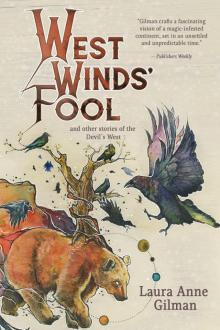 West Winds' Fool and Other Stories of the Devil's West
West Winds' Fool and Other Stories of the Devil's West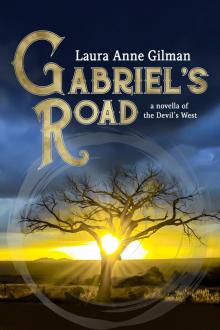 Gabriel's Road
Gabriel's Road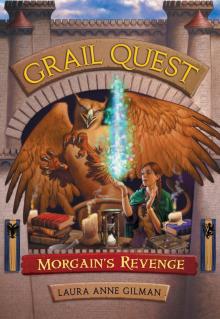 Morgain's Revenge
Morgain's Revenge The Shattered Vine
The Shattered Vine Laura Anne Gilman - Tales of the Cosa Nostradamus
Laura Anne Gilman - Tales of the Cosa Nostradamus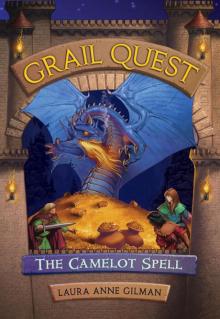 The Camelot Spell
The Camelot Spell VISITORS
VISITORS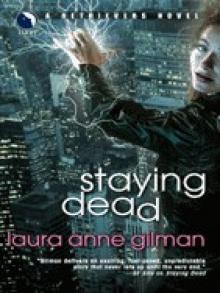 Staying Dead
Staying Dead Silver on the Road
Silver on the Road Weight of Stone
Weight of Stone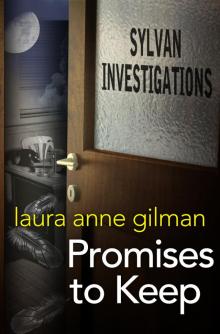 Promises to Keep
Promises to Keep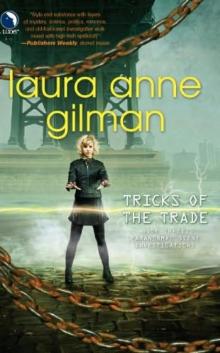 Tricks of the Trade psi-3
Tricks of the Trade psi-3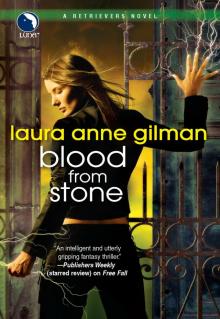 Blood from Stone
Blood from Stone Soul of Fire tp-2
Soul of Fire tp-2![Pack of Lies [2] Read online](http://i1.bookreadfree.com/i1/04/01/pack_of_lies_2_preview.jpg) Pack of Lies [2]
Pack of Lies [2] Burning Bridges
Burning Bridges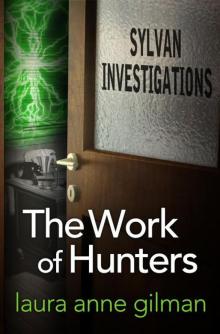 The Work of Hunters
The Work of Hunters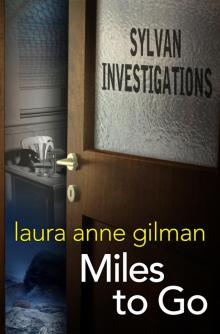 Miles to Go
Miles to Go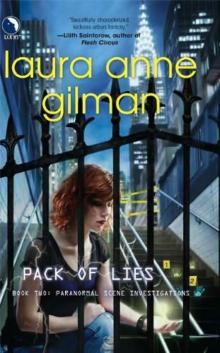 Pack of Lies psi-2
Pack of Lies psi-2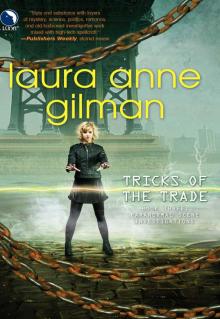 Tricks of the Trade
Tricks of the Trade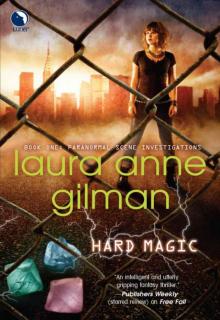 Hard Magic
Hard Magic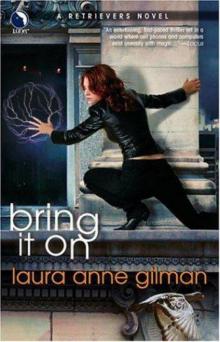 Bring It On
Bring It On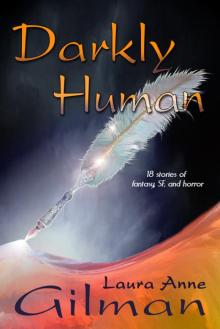 Darkly Human
Darkly Human The Cold Eye
The Cold Eye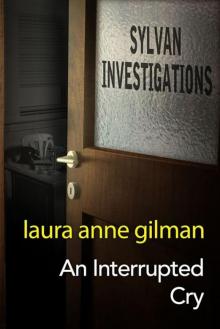 An Interrupted Cry
An Interrupted Cry Soul of Fire
Soul of Fire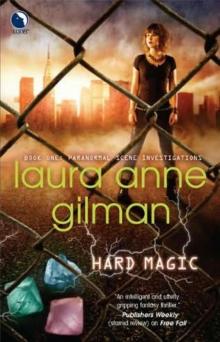 Hard Magic psi-1
Hard Magic psi-1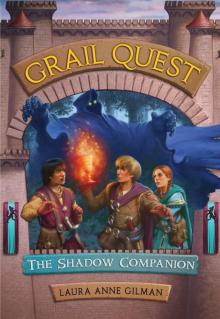 The Shadow Companion
The Shadow Companion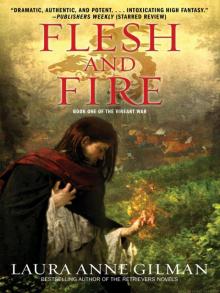 Flesh and Fire
Flesh and Fire